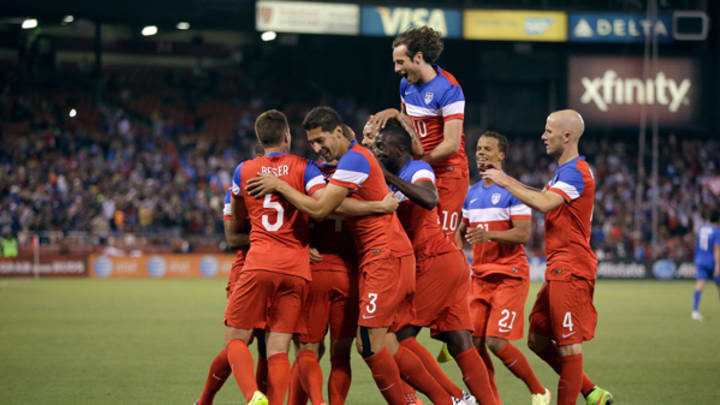Despite imperfections, USA takes 'fine' performance vs. Azerbaijan, marches forward

The U.S. men's national team celebrates Aron Johannsson's goal that iced a 2-0 win over Azerbaijan on Tuesday. (Ezra Shaw/Getty Images)

SAN FRANCISCO – It was “fine.”
That was the word Jurgen Klinsmann used over and over during his remarks following the U.S. men's national team's 2-0 victory over Azerbaijan on Tuesday night in a World Cup preparation friendly at Candlestick Park.
It was fine, because even though the U.S. struggled to link passes and crack a defense that parked 10 players behind the ball for most of the game, two late goals by substitutes Mix Diskerud (in the 75th minute) and Aron Johannsson (in the 81st) earned the victory.
It was fine, because the conditions, including a driving wind that made it difficult even to settle the ball on set pieces, were mostly to blame for the errant passes and disjointed play.
It was fine, because the team was sluggish after two long weeks of training; fine, because the goal isn’t to look perfect at this point in the team’s preparations for the World Cup; fine, because this is just the early stages of the “process” (another of Klinsmann's favorite words) and so there is no sense in reading too much into one game.
“Everyone did fine. They did what they were supposed to do,” Klinsmann said. “Overall it was fine.”
WAHL: Three Thoughts on the USA's 2-0 win over Azerbaijan
If you think the U.S coach doth protest too much, know he is not alone.
“We are exactly where we expected to be. We had a good two weeks here and finish off with a good 90 minutes against a difficult team. Regardless of the result, we feel good about where we are,” said midfielder Michael Bradley. “The reality is that these games are -- you want the results to be right because, obviously, that builds momentum and helps with confidence, but the results are not the most important thing. When people look back on 2014 they aren’t going to be talking about games against Azerbaijan and Turkey [June 1] and Nigeria [June 1].”
That is true, but for at least the next few days they will talk about the team’s performance Tuesday night, and those discussions are sure to settle on some of the more disconcerting aspects.
The U.S. came out in a 4-4-2 with a diamond midfield, with Jermaine Jones at the base of the diamond in front of the back four. It looked like what it is: A formation the U.S. has not entirely mastered.
AS IT HAPPENED: USA 2, Azerbaijan 0
“We have been training for two weeks now to the get lines right and makes sure our spacing is right. With a flat four it is a lot easier to find your spacing, the diamond is different,” goalkeeper Tim Howard said.
Klinsmann praised striker Jozy Altidore’s effort, but he didn’t have a shot on goal. He didn’t look as helpless as he did in a Sunderland jersey but also wasn’t nearly as dangerous as he’ll need to be in Brazil. Chris Wondolowski, who started in place of late scratch Clint Dempsey (who had a sore groin Klinsmann that called “not serious”), failed to convert two headers in the first half that he’d say he should have buried.
One of the few positives was Diskerud’s influence on the game when he entered in the 71st minute. On his goal, Diskerud fought to head a loose ball off a free kick down to Bradley, who hit a half volley that was cleared off the line by defender Elvin Yunuszade. But the ball then fell right to Diskerud, who buried his shot in the upper right corner from about eight yards out.
CREDITOR: Dempsey a late, 'precautionary' scratch with groin injury
“It was an easy job for me to score,” Diskerud said. “I got tackled right when I hit the ball so I was just laying on the ground in agony.”
Diskerud scored wearing the No. 10 jersey, Landon Donovan’s old number. He didn’t choose the number; it was assigned to him, but he has the kind of roll-with-it personality that makes it less of burden for him that it might have been for others.
“It is an honor. A lot of great players have worn that number for the U.S. previously. I will enjoy it,” he said. “When it comes to Landon, I am sure we will be playing together again someday, and, of course, he has more caps than me and so I am just borrowing the No. 10 for now . . .. I don’t feel any pressure at all. I am just having fun with it.”
Diskerud, who typically plays centrally but lined up on the right Tuesday, was among a group of players greatly affected by the failure of the U.S. to qualify for the 2012 London Olympics, Klinsmann said. Some players from Diskerud’s generation never really recovered from that setback, the U.S. manager added, but Diskerud “shook it off and continued his path and came on very strongly at the Gold Cup last summer, and he kept building and building. He’s obviously got great vision, passing technique, and he is calm on the ball. It was nice to see him come in and make a contribution.”
Said Diskerud: “You grow a lot from certain experiences. It was a goal of mine to reach the Olympics. But another goal of mine was to reach the World Cup, and so I am pretty satisfied right now.”
